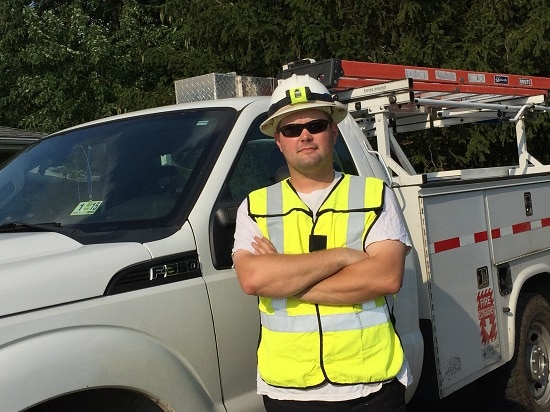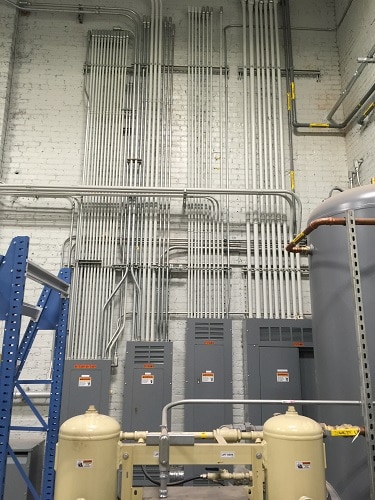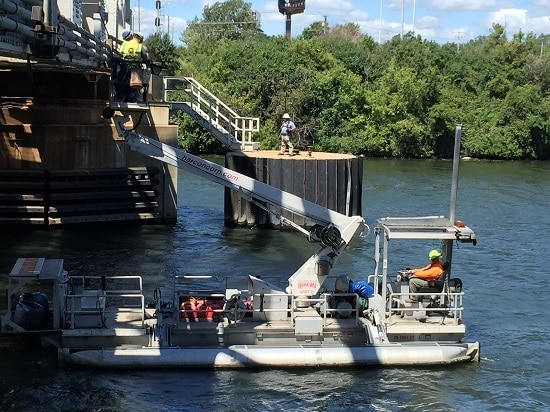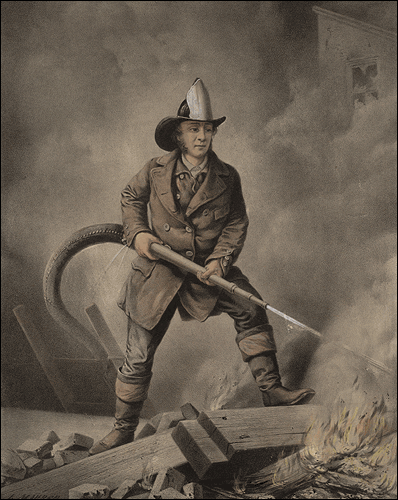
Last year, we ran a series of articles extolling the virtues and eliminating the myths of the skilled trades. While we were able to cover a lot of ground, there wasn’t room to provide a detailed picture of all the various trades out there for men to pursue. So, as an accompaniment to our So You Want My Job series, we’re running regular installments of So You Want My Trade: interviews that offer an inside view of the pluses and minuses of various blue collar career choices.
Electric. The word just has a certain aura, doesn’t it? Electricity remains this mystical and invisible force that powers almost every aspect of our lives. It also carries a large amount of danger; electricity has the power to quickly kill any who get in its way. And yet there are some brave folks who dare to work with these currents of energy day in and day out. Matt Day is among their ranks, and I interviewed him about this profession; as you’ll see, it’s true that there is some danger, but for the most part, it’s an enjoyable and challenging career that any man can aspire to.
1. Tell us a little about yourself (Where are you from? How old are you? Describe your job and how long you’ve been at it, etc.).
My name is Matt Day, I’m 35 years old, married and have two kids age 10 and 7. I live in a small town in North West Indiana about 40 miles South East of Chicago and I am an electrician. Technically I’m a Journeyman Inside Wireman with the IBEW, and no, the majority of my work is not indoors. I have been at it for a little more than 16 years. I worked in the construction side for just under 15 years. Around 5 years ago I started looking around for different avenues where I could utilize my training. With the slump in the economy at that time and some personal evaluations, I felt it was time to make a transition out of construction. So a little more than a year ago I started working for a reputable railroad as a road electrician. I am still a member of the IBEW and although it’s a different classification than construction I was able maintain my “A card” status. I started out in electrical work when I was 19 years old, so just about a year after I graduated high school. My first electrical job was for a non-Union contractor and I received just enough experience to know I wanted more. On one particular job, there was a gentleman working near us, who unknown to me, was an IBEW union member. He called the IBEW and told them to come speak to me and my work partner. I joined the Union shortly after that and started the IBEW-NJATC (International Brotherhood of Electrical Workers – National Joint Apprenticeship Training Committee) program. The rest, as they say, is history.
2. Why did you want to become an electrician? Was it something you always knew you wanted to do?
At first I didn’t want to be an electrician; I actually wanted to be an architect. Honestly, electrical work sounded, well, scary. My dad worked with electricity at a maintenance level and my grandfather was a tractor repairman in a steel mill dealing with DC electricity. So I had some honest exposure and insight from the two men I looked up to as to what electrical work actually involved. Once I was taught some basics from a non-Union contractor, I was hooked. It was exciting and technical, and I got to work with my hands every day. I loved being outside and in different locations. Not to mention, hands-on work just makes you feel strong, independent, and manly. So from that point on, yes, I knew I wanted to be an electrician.
3. Tell us a little bit about what you do as an electrician. In your case, you were in construction for 15 years, and now work for a railroad. Can you briefly describe each job?
With construction you travel to where the job is, and the primary focus is new construction, remodels, and additions. There is some maintenance-type work, but rare, at least in my area. There are 3 sectors in construction: residential, commercial, and industrial. Each sector is slightly different, but the biggest difference is simply the scale — of the job, of the material, and of the manpower. Typically for commercial and industrial jobs, although not always, an architect or engineer will create a layout of where the electrical equipment (i.e. conduit, receptacles, lights, junction boxes, distribution panels, wiring, etc.) will be installed. Once the inside wiremen arrive on the job they begin installing said equipment. Inevitably we will have to make some alterations or additions to the original plans, because in the real world, things change. Most of what you see on television is residential work, and while it does take skill and knowledge to work in a residential setting, it really is just the basics of what we do. Now most all of our controls are computerized, and we need to be able to understand and work with programmable controllers. There’s also the need for clean energy, so we are now seeing more photo voltaic and wind power demands.
With the railroad, we still need the same training and skill sets, only our focus is more on maintenance of the facilities the railroad owns, with some small construction jobs. I travel greater distances with the railroad than in construction, but that’s because our area is pretty vast, as you could imagine. It can be slightly slower paced than with construction. In maintenance you need to have a high capability to troubleshoot. You have to be able to listen to the customer or operator of the item that is broken, and determine what’s wrong and how to go about fixing it. With both areas, construction and maintenance, you need to be able to think on your feet and at times make quick, calculated decisions. The job is physical and technical in both areas. With advances in technology our job is ever changing, and to be competitive, we need to reeducate ourselves regularly.
4. Tell us a little bit about an average work day.
With construction you can expect to show up in the morning and receive your job briefing of what you are expected to accomplish for the day or even the week. There are strict deadlines that must be met and it’s fairly fast paced. Most jobs are bid on and the more efficiently you get your job done, the more money the contractor makes. You may have a “tool partner,” whom you will be partnered up with to complete the task, or you may work alone. In general though, you can expect to be installing material and equipment, which I mentioned before. When the job is completed you move to the next one. Which could be at the same location, like in industrial settings, or it could be 20 miles away.
The railroad is slightly slower paced. We work off of a work order system and only fix the things that are broken. We do have preventative maintenance we preform, as well as upgrades and remodels. The biggest difference is that I don’t make money for the railroad, the trains do. With both though, the expectations are the same. There will always be conduit, wiring, and other equipment to install and fix.

An example of panels and conduits that I might be expected to install.
5. What was your path to becoming an electrician? What kind of training and certifications did you need? Did you go to trade school?
The first thing to do is to contact your local IBEW union hall. The IBEW has an apprenticeship program where you receive training for the classification you choose. Journeyman Inside Wireman is only one classification. For instance, there is also a Lineman classification — they work on the transmission lines from the power company. Another classification is Tele-Data — they deal with phone, data, and security. There are some other classifications as well.
After you have found out what they require to join their apprenticeship program, you will be interviewed just as any other job. Typically the things they want to see are your transcripts from high school and/or college. The thing that I can remember them asking me is if I had taken algebra and how I did in the class. So all you young guys, study up on that algebra! You attend class 1 day a week and work the rest of the week, which is part of your on-job training. It’s a 4-year program and they teach you everything from how to bend and install conduit, Ohm’s Laws, formulas for finding figures like amperage, resistance, and wattage (which is algebra used daily!), National Electrical Code, and many other technical aspects of the trade and classification you choose. Many programs also work hand-in-hand with local colleges to provide their members with training in computers, writing, and leadership skills.
At the end of your training you receive a certification from your local IBEW and the International office for, in my case, a Journeyman Inside Wireman, or the classification title you trained for. That certification allows you to travel to other areas or states and work out of different IBEW locals. It’s the same certification that all IBEW locals adhere to, and that cities and towns look for when you perform electrical work. Another advantage is that many companies outside of construction, for example the automotive industry or other manufacturing facilities, are looking for certified electricians to join their ranks as well.
6. How do you find work as an electrician? Tell us your experience with the IBEW (electrician’s union), and perhaps what a young man entering the field today can expect of the job market.
I’ll focus on the construction side because the railroad, as with any maintenance job, is completely different. Once you’ve become a member of your local IBEW you will receive your jobs from the union hall office, through a book system. You simply sign a book on a first-come, first-serve basis and are assigned a number. When a contractor puts a call into the hall (meaning they tell the union hall they need “x” number of people for a specific job), you bid on that job. When your number comes up, you get that job. It’s a very simple and extremely fair way of getting work. The person with the number closest to 1 has most likely been off work the longest. The biggest thing I can stress is that construction work can be seasonal. Meaning you may not work in the colder months. Of course that depends entirely upon your region. For me, near Chicago, winters suck. Don’t let that scare you though, there are always jobs being done, just not at the same capacity as your warmer months.
If the work outlook at your union hall isn’t good for the “offseason,” you may be sitting at home for a few weeks or even months. You also have the option of traveling, which simply means that you find work out of another IBEW union hall. You do have to plan for layoffs though. If you work construction as opposed to maintenance, you will be laid off at some point. It’s not a bad thing; construction jobs have a definite start time and completion time. When the job is complete, you’re no longer needed on that job. So, off to the next one. If you plan ahead and save money, the slow times won’t affect you as much.
A word of advice: depending on your state, you may be able to collect unemployment during those off times to help offset any lack of money. That choice is entirely up to the individual. The job market depends solely on the area you’re in. Big cities and surrounding areas have more jobs going on, therefore have more to offer. Electricians are in high demand, and always will be. Don’t be afraid of that offseason. I learned to enjoy it and looked forward to it. It was like a vacation! I would work 10-12-hour days, 6 or 7 days a week during the busy time, so come winter, I was ready for a break.
With maintenance, you typically work for a company as opposed to working out of a hiring hall, and it’s a lot more secure as far as not having any down time. But there are tradeoffs. I don’t work as much overtime as I did in construction, thus making less money. I am also on call 24/7 with the railroad. I can get a phone call in the middle of church saying the power is out in building “x,” and I have to leave and go to work right then. As with any job there is a give and take. Each individual will have to weigh their options to see which they prefer.
7. What is the work/life balance like in your career?
For a young guy starting out, construction will suit him best. During busy months you work a lot with little time for “play.” You will learn some self-control with money and in other areas of life. A man with a family working construction isn’t difficult, there just isn’t a ton of family time during the summer. So when junior has a ball game, you may not make it. However, the slow times will more than make up for it. Construction allows for a person to work when they want and how much they want. If you don’t like a ton of overtime, or working in the winter months, you don’t work it. Maintenance work is more of a 40-hour-a-week job with occasional overtime, so it’s easier to have that family time. Which is one reason I chose to make a change from construction. The trade off, of course, is money. You can trade time for money, but it’s impossible to buy time back.
8. What’s the best part of your career?
I get to do something different every day. Even though it’s all electrical work, I only see my office in the morning. I go different places every day and do different aspects of the trade every day. One day I’m bending and installing conduit, and the next day I’m troubleshooting a bridge that won’t come down for a train to pass. I’m not an assembly line or office person, never have been. I have nothing against that career path, I just love the freedom that comes with working in the trades. While others are wondering “what’s it like outside,” I know what it’s like because I’m in it.

On a pontoon lift while inspecting and repairing lights used for marine navigation around a railroad bridge. Although the pontoon lift is not extremely common, it’s within the purview of my daily duties.
9. What’s the worst part?
The funny part about one of the best parts of the job, is that it’s also the worst part. Whether it’s a thunderstorm, blizzard, 110 degrees, below 0, windy, sunny, cloudy, muddy, or dry, I’m in it. You learn how to watch and dress for the weather real fast or you suffer.
10. What’s the biggest misconception people have about your job?
I believe it’s that so many think that if they can twist wires together, then they can do electrical work. Don’t get me wrong, there are some things that can be done by the average homeowner. However, if you’re uncertain, or don’t have a friendly electrician to call, don’t do it! You could overload a circuit, cause a short, or back feed something and end up burning your house down, or even worse, killing yourself or someone else. There are shows on television on the DIY and HGTV channels that make it seem like anyone can do any job in under 30 minutes. There’s nothing wrong with doing it yourself, as long as you know your limitations, and aren’t afraid of asking for help. Being an electrician is a skilled trade, and there are aspects of it that are not so DIY friendly. We are trained how to do our job, just as a doctor or lawyer is. It’s far better to pay a certified electrician to perform electrical work in your house than to pay for a new house, or funeral.
11. Any other advice, tips, commentary, or anecdotes you’d like to add?
Being an electrician is an excellent career choice and I would highly recommend it to anyone. Whether it’s the young man just out of high school, or the not so young man wanting to make a career change. Being an electrician, just as any other skilled trade, is skill you have for life. If you ever venture away into another career path, you can always go back to your trade if things don’t work out. Especially if you maintain your union card. You can simply just walk in the office, sign “the book,” and start bidding on jobs. Also don’t be afraid of the seasonal tag that is sometimes put on electrical construction. Yes things can get slow in cooler months, but not a standstill. Just plan for those slow months and you’ll be fine. A few other things:
Lockout-tagout is your friend. Contrary to popular belief, you don’t “get used” to getting shocked and once you’re dead you’re dead. No extra lives in the game of life. The first time you get shocked badly enough that you taste copper, you’ll be searching for an hour to find the source of the power from then on out.
Union, Union, Union! Remember, the Union brought us the 40-hour work week, overtime pay, along with several other benefits. While you can get an electrical job in the non-union sector, it’s far better to be an IBEW electrician. I speak from experience, I’ve worked both sectors. Also every job listing I’ve seen for an electrician, the company preferred a “Certified Electrician.” A certification you can only get from the IBEW. Better training, better pay, better benefits…period.
The first day of the apprenticeship school, you will probably see an electrical burn video. There have been some who get up and walk out, never to return. Hang in there, it’s not that long of a video.
Finally, not many other careers do you automatically get a cool nickname just for being in that trade. As an electrician, you will forever be known as “Sparky.”
Tags: So You Want My Job






